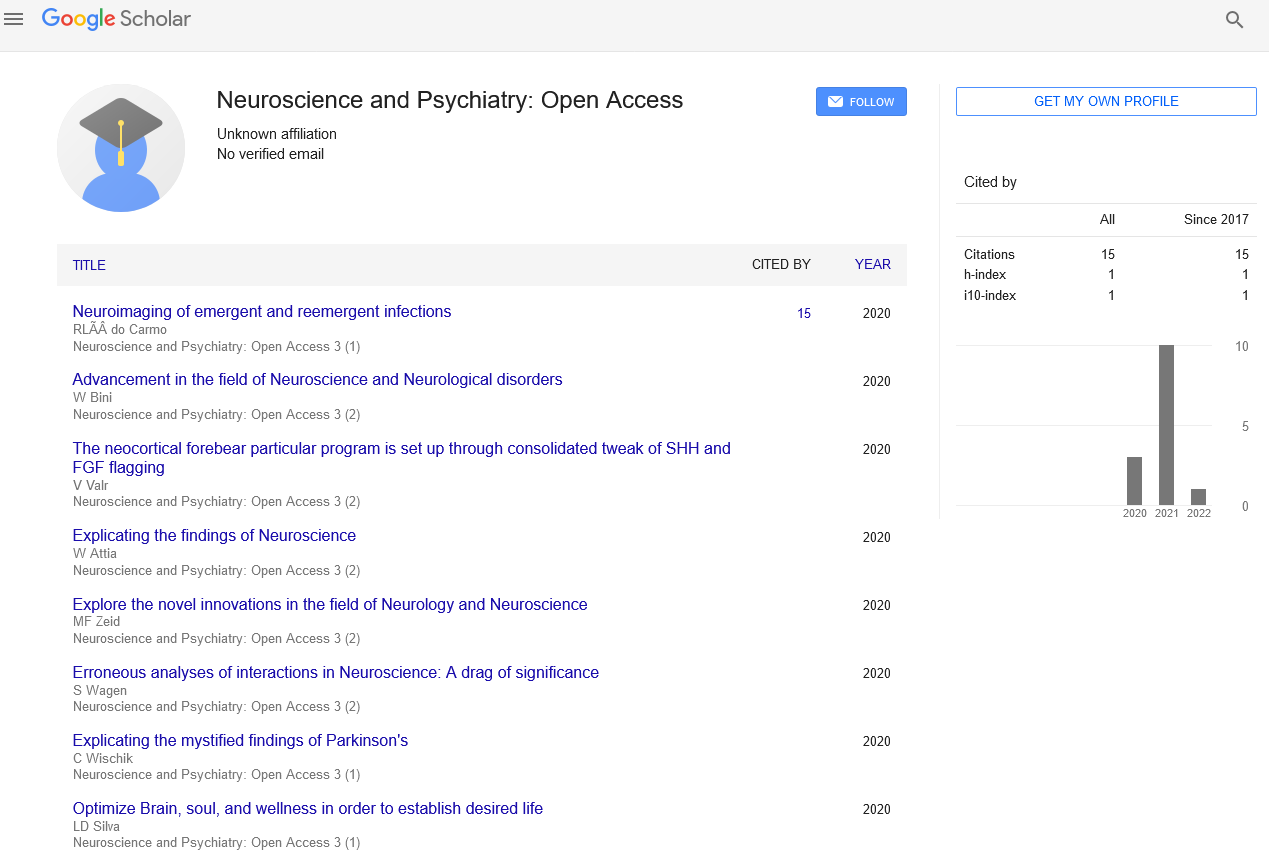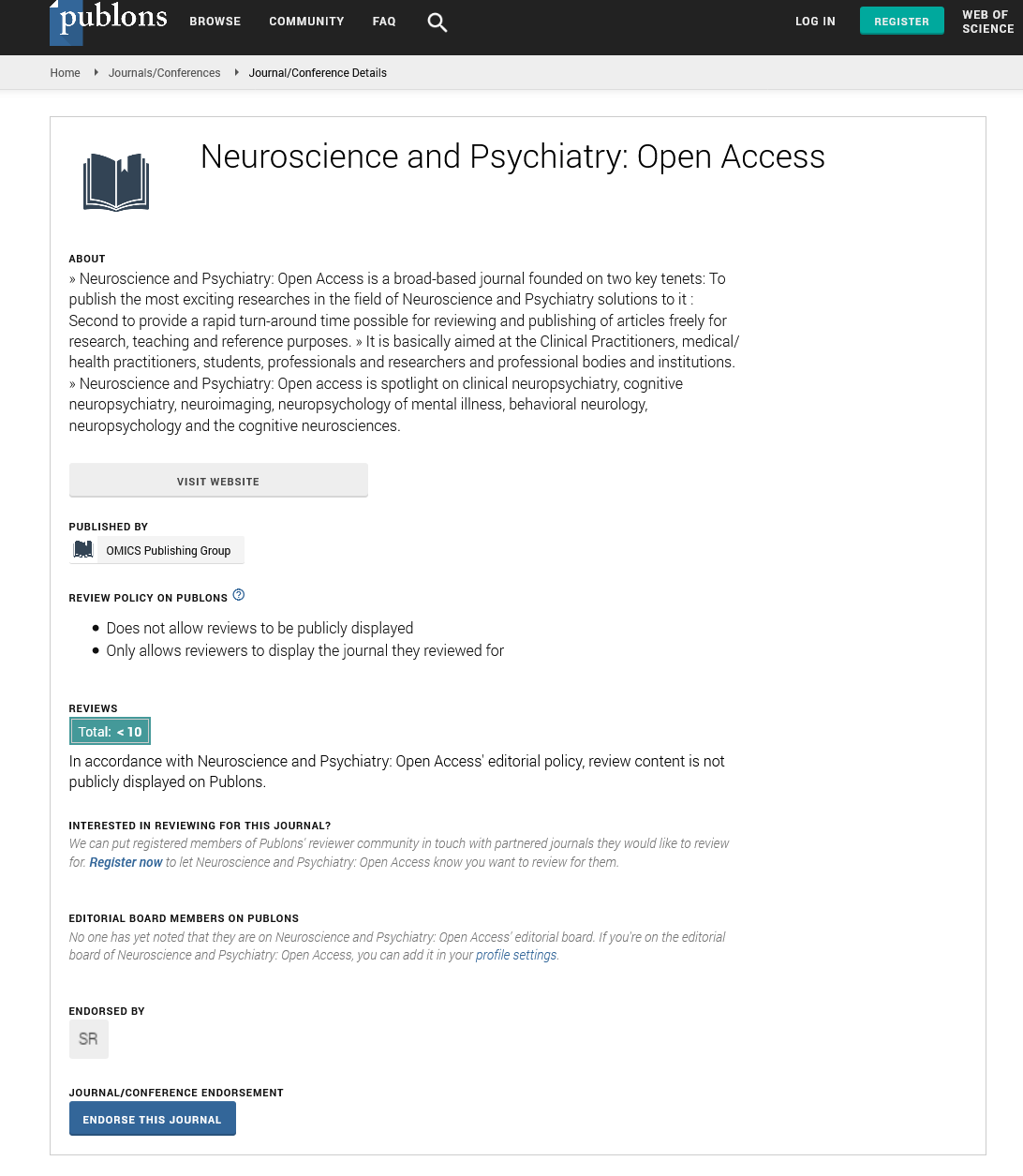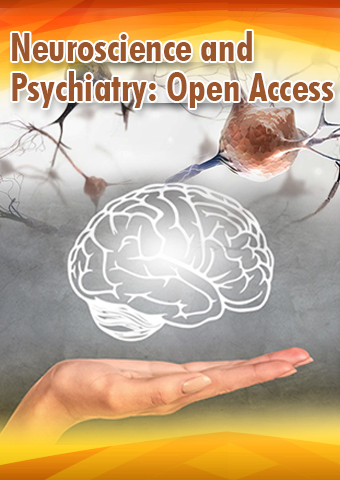Perspective - Neuroscience and Psychiatry: Open Access (2024) Volume 7, Issue 6
The Role of Genetics in Psychiatric Disorders
- Corresponding Author:
- Yoshiyuki Nishio
Department of Neuropsychiatry,
University of Tokyo,
Tokyo,
Japan
E-mail: nishio@gmail.com
Received: 19-11-2024, Manuscript No. NPOA-24-148652; Editor assigned: 22-11-2024, PreQC No. NPOA-24-148652 (PQ); Reviewed: 06-12-2024, QC No. NPOA-24- 148652; Revised: 17-12-2024, Manuscript No. NPOA-24-148652 (R); Published: 24-12-2024, DOI: 10.47532/npoa.2024.7(6).298-300
Introduction
Psychiatric disorders, such as schizophrenia, bipolar disorder, depression, and anxiety, affect millions of people worldwide, significantly impacting mental health and quality of life. While environmental factors like trauma and stress contribute to the development of these disorders, there is growing recognition of the role genetics plays in their onset and progression. In fact, psychiatric disorders often have strong hereditary components, which suggests that genetic makeup can predispose individuals to mental health conditions.
This article will explore how genetics influences psychiatric disorders, the latest research findings in this field, and the implications for diagnosis, treatment, and future directions in mental health care.
Description
The search for risk genes: Genetic research in psychiatry
Genome-Wide Association Studies (GWAS): In recent years, advances in genetic technology have enabled researchers to conduct Genome-Wide Association Studies (GWAS), which involve scanning the entire genome of thousands of individuals to identify genetic variants associated with specific psychiatric disorders. GWAS have identified numerous risk variants, known as Single Nucleotide Polymorphisms (SNPs), that are linked to psychiatric conditions.
For example, GWAS have identified multiple genetic variants associated with schizophrenia, many of which are involved in neurotransmitter systems such as dopamine and glutamate. These findings have shed light on the biological pathways that may contribute to the development of schizophrenia and other mental health conditions.
Polygenic Risk Scores (PRS)
Another important concept in psychiatric genetics is the idea of Polygenic Risk Scores (PRS). Since psychiatric disorders are influenced by many genes, each of which contributes a small amount to the overall risk, researchers can calculate a polygenic risk score based on the presence of multiple risk variants. PRS provides a cumulative measure of an individual’s genetic risk for a particular disorder.
While PRS is still in the early stages of development, it has the potential to be used as a tool for identifying individuals who are at a higher genetic risk of developing psychiatric disorders. However, it is important to note that genetic risk scores are not deterministic; they only indicate a predisposition, and environmental factors still play a critical role in determining whether an individual will develop a disorder.
Copy Number Variations (CNVs)
In addition to SNPs, researchers have also identified Copy Number Variations (CNVs) as potential contributors to psychiatric disorders. CNVs are structural changes in the genome that involve the deletion or duplication of segments of DNA. Some CNVs have been linked to increased risk for conditions like autism spectrum disorder, schizophrenia, and intellectual disabilities.
Gene-environment interactions
While genetic factors contribute significantly to psychiatric disorders, it is important to recognize that genes do not act in isolation. Psychiatric disorders are the result of complex interactions between genetic predispositions and environmental factors. This concept is referred to as Gene-Environment interaction (GxE).
Stress and trauma
One of the most studied environmental factors in psychiatry is stress, particularly early-life stress and trauma. Research has shown that individuals who have a genetic predisposition to psychiatric disorders may be more sensitive to the effects of stress. For example, the serotonin transporter gene (5-HTTLPR) has been linked to an increased risk of depression, but only in individuals who have experienced significant stress or trauma. This suggests that the genetic risk for psychiatric disorders can be triggered or amplified by adverse life experiences.
Epigenetics
Epigenetics refers to changes in gene expression that do not involve alterations in the DNA sequence itself. Environmental factors, such as stress, nutrition, and substance use, can lead to epigenetic changes that affect how genes are expressed. These changes can influence brain function and behavior, potentially contributing to the development of psychiatric disorders.
For example, studies have shown that individuals who experience childhood trauma may have altered patterns of DNA methylation, an epigenetic modification that can affect gene expression. These epigenetic changes may increase the risk of developing conditions like depression, anxiety, or Post-Traumatic Stress Disorder (PTSD).
Specific psychiatric disorders and genetic findings
Schizophrenia: Schizophrenia has one of the highest heritability estimates among psychiatric disorders, and genetic research has identified several genes and pathways involved in its development. One of the most well-known genetic findings in schizophrenia is the COMT gene, which is involved in dopamine metabolism. Variants of this gene have been associated with altered dopamine signaling, which is thought to play a role in the symptoms of schizophrenia.
In addition to individual genes, large-scale GWAS have identified hundreds of genetic variants that contribute to the risk of schizophrenia. Many of these variants are involved in synaptic function, neurotransmitter signaling, and immune system regulation, highlighting the complexity of the disorder’s genetic underpinnings.
Bipolar disorder: Bipolar disorder is another highly heritable psychiatric condition, and genetic studies have identified several genes associated with the disorder. The CACNA1C gene, which codes for a calcium channel subunit, has been linked to both bipolar disorder and schizophrenia. Calcium channels play a crucial role in regulating neurotransmitter release and neuronal excitability, suggesting that disruptions in these processes may contribute to the mood swings seen in bipolar disorder.
Like schizophrenia, bipolar disorder is influenced by multiple genetic factors, and research is ongoing to identify the specific pathways involved.
Major depressive disorder: Major Depressive Disorder (MDD) is a complex condition with a moderate genetic component. While individual genetic variants associated with depression have been difficult to pinpoint, recent GWAS have identified several genes involved in neurotransmitter systems, neuroplasticity, and stress response.
For example, variants in the BDNF (Brain- Derived Neurotrophic Factor) gene have been linked to depression. BDNF plays a critical role in promoting the survival and growth of neurons, and reduced levels of BDNF have been associated with depressive symptoms.
Autism Spectrum Disorder (ASD): Autism Spectrum Disorder (ASD) is another highly heritable neurodevelopmental condition, and genetic research has made significant progress in identifying the genes involved. De novo mutations (mutations that are not inherited but occur spontaneously) have been found to play a role in the development of ASD. Several genes involved in synaptic function and neuronal communication have been linked to ASD, including SHANK3, which is important for synaptic structure.
Conclusion
The neuroscience of memory reveals the incredible complexity of how the brain encodes, stores, and retrieves information. Through a network of brain structures such as the hippocampus, amygdala, and prefrontal cortex, memory allows us to navigate the world, learn from experience, and maintain our sense of identity. Advances in neuroscience are shedding light on memory disorders and offering potential new therapies, making it a promising field for future research.


